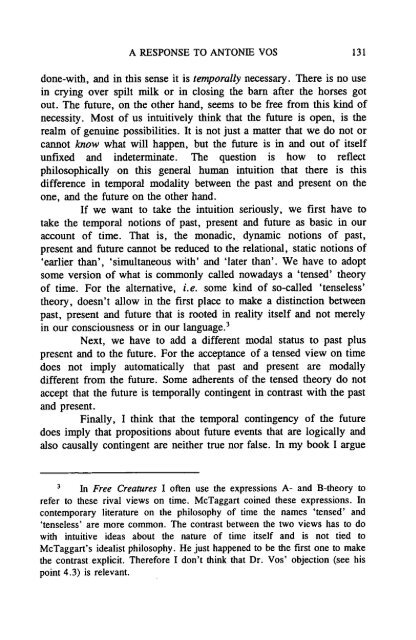Jaarboek Thomas Instituut 1997 - Thomas Instituut te Utrecht
Jaarboek Thomas Instituut 1997 - Thomas Instituut te Utrecht
Jaarboek Thomas Instituut 1997 - Thomas Instituut te Utrecht
You also want an ePaper? Increase the reach of your titles
YUMPU automatically turns print PDFs into web optimized ePapers that Google loves.
A RESPONSE TO ANTONIE VOS 131<br />
done-with, and in this sense it is <strong>te</strong>mporally necessary. There is no use<br />
in crying over spilt milk or in closing the barn af<strong>te</strong>r the horses got<br />
out. The future, on the other hand, seems to be free from this kind of<br />
necessity. Most of us intuitively think that the future is open, is the<br />
realm of genuine possibilities. It is not just a mat<strong>te</strong>r that we do not or<br />
cannot know what will happen, but the future is in and out of itself<br />
unfixed and inde<strong>te</strong>rmina<strong>te</strong>. The question is how to reflect<br />
philosophically on this general human intuition that there is this<br />
difference in <strong>te</strong>mporal modality between the past and present on the<br />
one, and the future on the other hand.<br />
If we want to take the intuition seriously, we first have to<br />
take the <strong>te</strong>mporal notions of past, present and future as basic in our<br />
account of time. That is, the monadic; dynamic notions of past,<br />
present and future cannot be reduced to the relational, static notions of<br />
'earlier than', 'simultaneous with' and 'la<strong>te</strong>r than'. We have to adopt<br />
some version of what is commonly called nowadays a '<strong>te</strong>nsed' theory<br />
of time. For the al<strong>te</strong>rnative, i.e. some kind of so-called '<strong>te</strong>nseless'<br />
theory, doesn't allow in the first place to make a distinction between<br />
past, present and future that is roo<strong>te</strong>d in reality itself and not merely<br />
in our consciousness or in our language."<br />
Next, we have to add a different modal status to past plus<br />
present and to the future. For the acceptance of a <strong>te</strong>nsed view on time<br />
does not imply automatically that past and present are modally<br />
different from the future. Some adherents of the <strong>te</strong>nsed theory do not<br />
accept that the future is <strong>te</strong>mporally contingent in contrast with the past<br />
and present.<br />
Finally, I think that the <strong>te</strong>mporal contingency of the future<br />
does imply that propositions about future events that are logically and<br />
also causally contingent are neither true nor false. In my book I argue<br />
In Free Creatures I of<strong>te</strong>n use the expressions A- and B-theory to<br />
refer to these rival views on time. McTaggart coined these expressions. In<br />
con<strong>te</strong>mporary li<strong>te</strong>rature on the philosophy of time the names '<strong>te</strong>nsed' and<br />
'<strong>te</strong>nseless' are more common. The contrast between the two views has to do<br />
with intuitive ideas about the nature of time itself and is not tied to<br />
McTaggart's idealist philosophy. He just happened to be the first one to make<br />
the contrast explicit. Therefore I don't think that Dr. Vos' objection (see his<br />
point 4.3) is relevant.








